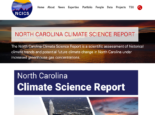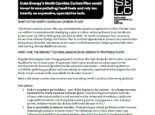North Carolina climate action
North Carolina could lead the way on climate action.
A recent poll shows that a majority of North Carolina voters believe the state should increase its use of clean energy sources, decrease its reliance on polluting fossil fuels, and speed up the transition toward a clean energy economy. North Carolinians increasingly feel the impacts of climate change — from flooding, slower storms that drop more rain, rising sea levels that are harming coastal areas, and warmer and more humid days and nights — and want to act now to protect their families and communities.
North Carolina took important first steps towards tackling climate change when the General Assembly enacted bipartisan legislation that requires steep cuts in heat-trapping carbon pollution from fossil-fueled power plants.
We’re all in this together: climate change is already harming people across the state. It’s crucial that we heed the calls of North Carolinians demanding that monopoly utilities reduce their carbon pollution as quickly as possible and as cost effectively as possible.
David Neal, SELC senior attorney
North Carolina Carbon Plan
The new law tasks the North Carolina Utilities Commission with developing a plan to meet its carbon pollution reduction requirements and reviewing that plan every two years.
Unfortunately, North Carolina’s regulated monopoly Duke Energy proposed a plan that would delay meeting the carbon pollution reduction requirements established under law, rely on expensive, unproven technologies, and spend customers’ money on new methane and carbon-polluting gas plants. Duke’s proposed plan would lock North Carolinians into decades more dependence on costly, polluting fossil fuels – the same energy sources that have led to rolling blackouts during extreme weather events.
The Southern Environmental Law Center is advocating for a no-regrets pathway relying on clean, cost-effective resources like energy efficiency, solar, wind, and battery storage and rapidly phasing out dirty fossil fuels. We will have an opportunity to present our plan to the commission in early 2024.
Reimagining our transportation system

Just like minimizing emissions from the power sector, moving toward a clean, accessible transportation system is critical for addressing climate change and creating safer, more equitable communities. The NC Department of Transportation recently issued a plan to accelerate the reduction of carbon pollution from our transportation system. In November 2023, we launched Clean Connected Communities, an advocacy network that unites community leaders, clean transportation advocates, citizens, and experts in a concerted push for policy changes and community-driven transportation solutions.




